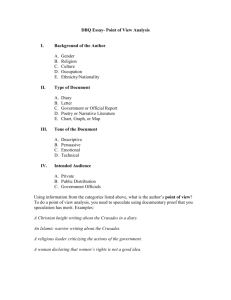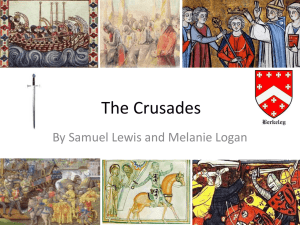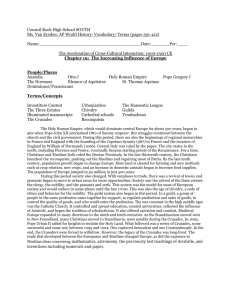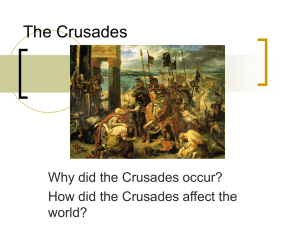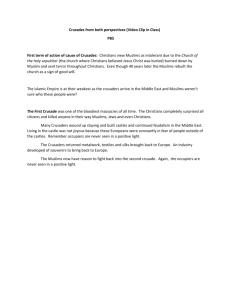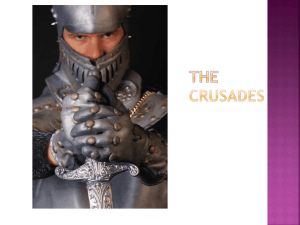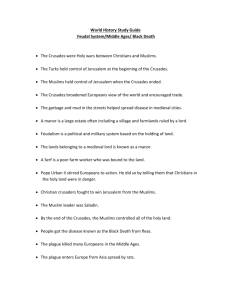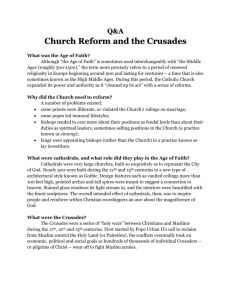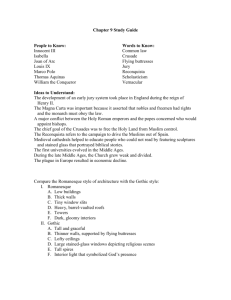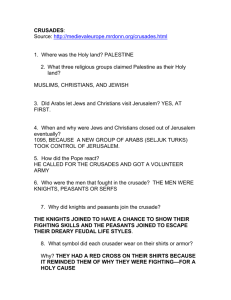DBQ FOCUS: Crusades
advertisement
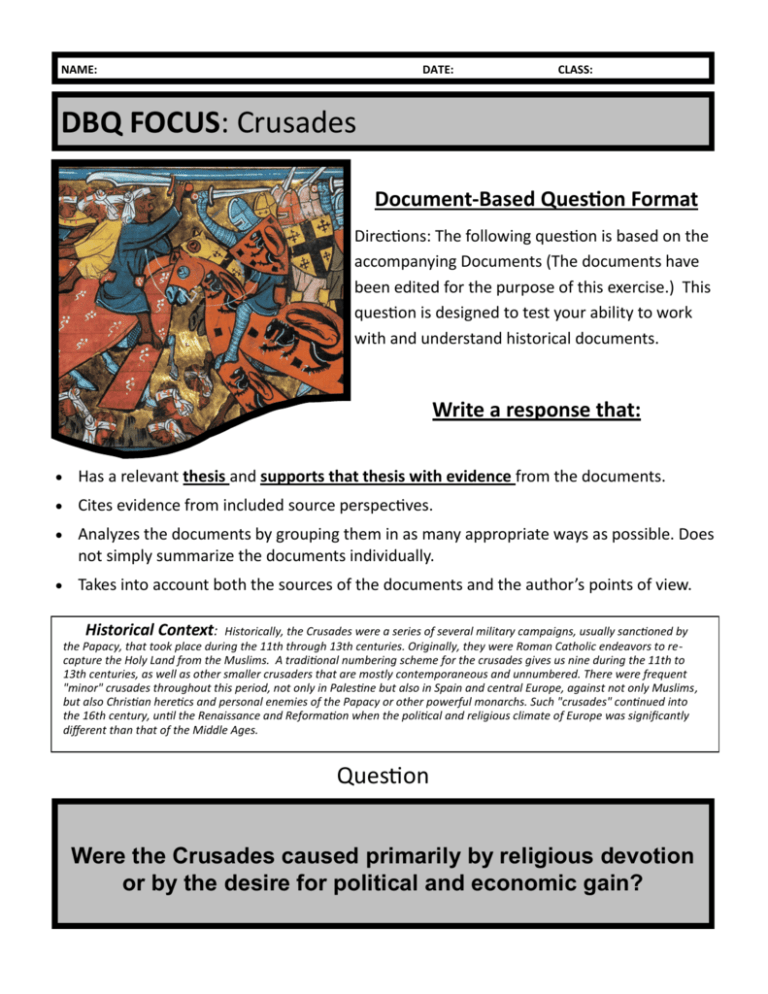
NAME:
DATE:
CLASS:
DBQ FOCUS: Crusades
Document-Based Question Format
Directions: The following question is based on the
accompanying Documents (The documents have
been edited for the purpose of this exercise.) This
question is designed to test your ability to work
with and understand historical documents.
Write a response that:
Has a relevant thesis and supports that thesis with evidence from the documents.
Cites evidence from included source perspectives.
Analyzes the documents by grouping them in as many appropriate ways as possible. Does
not simply summarize the documents individually.
Takes into account both the sources of the documents and the author’s points of view.
Historical Context: Historically, the Crusades were a series of several military campaigns, usually sanctioned by
the Papacy, that took place during the 11th through 13th centuries. Originally, they were Roman Catholic endeavors to recapture the Holy Land from the Muslims. A traditional numbering scheme for the crusades gives us nine during the 11th to
13th centuries, as well as other smaller crusaders that are mostly contemporaneous and unnumbered. There were frequent
"minor" crusades throughout this period, not only in Palestine but also in Spain and central Europe, against not only Muslims,
but also Christian heretics and personal enemies of the Papacy or other powerful monarchs. Such "crusades" continued into
the 16th century, until the Renaissance and Reformation when the political and religious climate of Europe was significantly
different than that of the Middle Ages.
Question
Were the Crusades caused primarily by religious devotion
or by the desire for political and economic gain?
Document 1
Source: Pope Urban II, 1095.
Student Analysis
…."Although, O sons of God, you have promised more firmly than ever to keep the
peace among yourselves and to preserve the rights of the church, there remains
still an important work for you to do. Freshly quickened by the divine correction,
you must apply the strength of your righteousness to another matter which concerns you as well as God. For your brethren {brothers} who live in the east are in
urgent need of your help, and you must hasten to give them the aid which has
often been promised them. For, as the most of you have heard, the Turks and Arabs
have attacked them and have conquered the territory of Romania [the Greek empire] as far west as the shore of the Mediterranean and the Hellespont, which is
called the Arm of St. George. They have occupied more and more of the lands of
those Christians, and have overcome them in seven battles. They have killed and
captured many, and have destroyed the churches and devastated the empire. If you
permit them to continue thus for awhile with impurity {not pure}, the faithful of
God will be much more widely attacked by them. On this account I, or rather the
Lord, beseech you as Christ's heralds to publish this everywhere and to persuade all
people of whatever rank, foot-soldiers and knights, poor and rich, to carry aid
promptly to those Christians and to destroy that vile {disgusting} race from the
lands of our friends... Moreover, Christ commands it.” All who die by the way,
whether by land or by sea, or in battle against the pagans, shall have immediate
remission {forgiveness} of sins. This I grant them through the power of God with
which I am invested. O what a disgrace if such a despised and base race, which worships demons, should conquer a people which has the faith of omnipotent {allpowerful} God and is made glorious with the name of Christ!....
Why does Pope Urban II want Christians
to go to the Middle East to fight?
What reward does he give to those who
respond to his appeal?
Document 2
Source: Ekkehard’s Hierosolymita, a history, 1099.
“[After Urban had aroused the spirits of all by the promise of forgiveness to those
who undertook the expedition with single-hearted devotion,] toward one hundred
thousand men were appointed to the immediate service of God from Aquitaine and
Normandy, England, Scotland, Ireland, Brittany, Galicia, Gascony, France, Flanders,
Lorraine, and from other Christian peoples, whose names I no longer retain. It was
truly an army of “crusaders,” for they bore the sign of the cross on their garments
as a reminder that they should mortify {severely discipline} the flesh, and in the
hope that they would in this way triumph over the enemies of the cross of Christ, as
it had once come to pass in the case of the great Constantine. Thus, through the
marvelous and unexampled working of divine dispensation {release}, all these
members of Christ, so different in speech, origin, and nationality, were suddenly
brought together as one body through their love of Christ.
Student Analysis
What was the response all over Europe
to the speech by Pope Urban II?
Document 3
Source: Unknown Source
The Crusades failed in their chief goal: the conquest of the Holy Land. They also left
a bitter legacy of religious hatred behind them. In the Middle East, both Christians
and Muslims committed appalling atrocities in the name of religion. In Europe, crusaders sometimes turned their fury against Jews, massacring entire communities.
Student Analysis
Why does this document call the legacy
of the crusades a bitter one?
Document 4
Source: Chronicles of Fulcher of Chartres, late 11c.
Consider, I pray, and reflect bow in our time God has transferred the West into the
East, For we who were Occidentals now have been made Orientals. He who was a
Roman or a Frank is now a Galilaean, or an inhabitant of Palestine. One who was a
citizen of Rheims or of Chartres now has been made a citizen of Tyre or of Antioch.
We have already forgotten the places of our birth; already they have become unknown to many of us, or, at least, are unmentioned. Some already possess here
homes and servants which they have received through inheritance. Some have taken wives not merely of their own people, but Syrians, or Armenians, or even Saracens who have received the grace of baptism….Our parents and relatives from day
to day come to join us, abandoning, even though reluctantly, all that they possess.
For those who were poor there, here God makes rich. Those who had few coins,
here possess countless besants {an ornament} ; and those who had not had a villa,
here, by the gift of God, already possess a city. Therefore why should one who has
found the East so favorable return to the West? God does not wish those to suffer
want who, carrying their crosses, have vowed to follow Him, nay even unto the
end….
Student Analysis
What are the financial benefits of
fighting as a Crusader?
Document 5
Source: “Legacy of the Crusades,” Aramco World.
. . . Then, just as the Crusaders had been inspired at least in part by commercial
motives, those 200 years of constant coming and going between East and West
obviously gave trade a tremendous boost. Merchants, studying the itineraries
[routes] of the cross-bearers [crusaders] who paved the way, discovered the most
direct routes between eastern Mediterranean ports and the heart of Europe. Venice was a particularly active port of entry for goods imported from the Middle East
and India. From there the goods traveled a well established route through the Brenner Pass, up the Rhine to Brussels and then north to the Baltic Sea. Many a town
which lies along this course owes its existence to a brisk demand for exotic wares
from the East by medieval Europeans. . . .
Student Analysis
What is one economic change brought
about by the Crusades during the
medieval period?
Document 6
Source: trans. Oliver J. Thatcher, and Edgar Holmes McNeal
“Now we hope that none of you will be slain, but we wish you to know that the
kingdom of heaven will be given as a reward to those who shall be killed in this war.
For the Omnipotent knows that they lost their lives fighting for the truth of the
faith, for the preservation of their country, and the defense of Christians. And
therefore God will give then, the reward which we have named.” - Migne, Patrologia Latina
Student Analysis
What does the document suggest how
European Christians felt about fighting
in the Crusades?
Document 7
Source: Chronicles of Fulcher of Chartres, 1127.
“…[W]e who were Occidentals (Westerners) now have been made Orientals
(Easterners). He who was a Roman or a Frank is now a Galilean or a Palestinian. One
who was a citizen of Rheims or of Chartres(in France) now has been made a citizen
of Tyre or of Antioch (in the Levant). We have already forgotten the places of our
birth… Some already possess here homes and servants which they have received
through inheritance. Some have taken wives not merely of their own people, but
Syrians, or Armenians, or even Saracens who have received the grace of baptism…
For those who were poor [in Europe], here God makes rich. Those who had few
coins, here possess countless [coins]; and those who had not had a villa, here, by
the gift of God, already possess a city. Therefore why should one who has found the
East so favorable return to the West?
Student Analysis
What is happening to those Europeans
who come to fight in the Middle East?
Document 8
Source: Krey, August C. The First Crusade: The Accounts of Eyewitnesses and Participants. Princeton, Princeton University Press, 1921.
At the beginning of summer in the same year in which Peter, and Gottschalk, after
collecting an army, had set out, there assembled a large [number] of Christians
from diverse kingdoms and lands. . . . They rose in a spirit of cruelty against the
Jewish people and slaughtered them without mercy; they destroyed the houses and
synagogues of the Jews and divided among themselves a very large amount of
money. -Albert of Aix
Student Analysis
What was the impact of Crusader occupation of the Holy Land?
Document 9
Source: The Islamic leader Saladin’s speech urging his people to retake Jerusalem,
1187.
“If God blesses us by enabling us to drive His enemies out of Jerusalem, how fortunate and happy we would be! For Jerusalem has been controlled by the enemy for
ninety-one years, during which time God has received nothing from us here in the
way of adoration. At the same time, the zeal {devotion} of the Muslim rulers to deliver it languished {weakened}. Time passed, and so did many indifferent generations, while the Franks succeeded in rooting themselves strongly there. Now God
has reserved the merit of its recovery for one house, the house of the sons of
Ayyub [Saladin’s family], in order to unite all hearts in appreciation of its members.”
Document 10
Source: The Perfect History by Ibn Al-Athir (Arab Muslim Historian), 1200s.
“The population was put to the sword by the Franks, who pillaged (raided) the area
for a week… In Masjid alAqsa [mosque next to the Dome of the Rock on the Temple
Mount] the Franks slaughtered more than 70,000 people, among them a large number of Imams and Muslim scholars… The Franks stripped the Dome of the Rock of
more than forty silver candelabra… and a great silver lamp weighing forty-four Syrian pounds, as well as a hundred and fifty smaller silver candelabra and more than
twenty gold ones, and a great deal more booty.”
Student Analysis
What reasons did Saladin give for retaking Jerusalem?
Student Analysis
What are the financial benefits of
fighting as a Crusader?
Comments:
